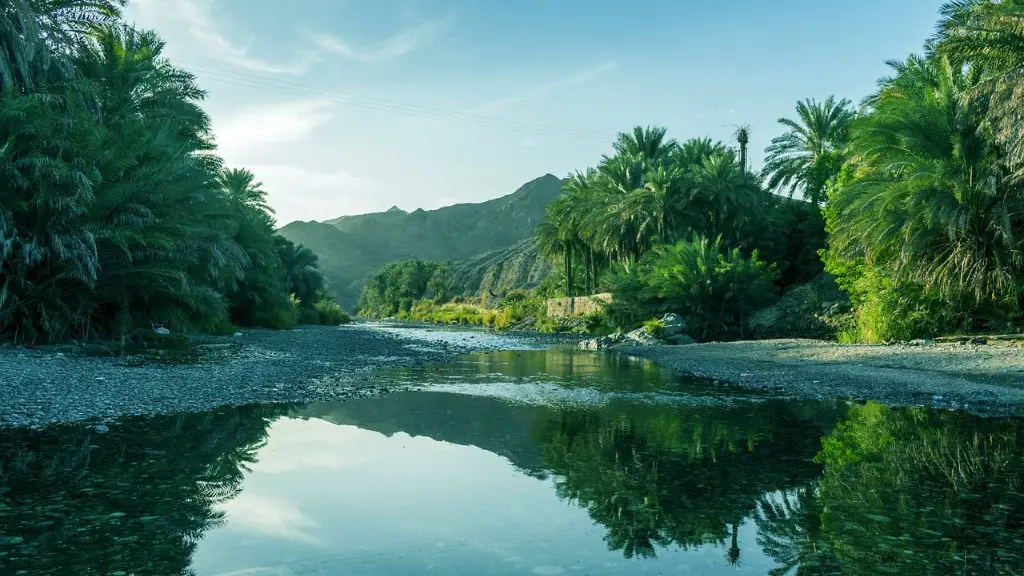The Mississippi River is not just a geographical presence, it is also a geopolitical force to be reckoned with. Many countries, cities and states border it or have it run right through their center. It offers numerous economic opportunities for those living in these areas, but it also brings its own unique challenges, and has had a profound effect on the history and politics of the United States.
It is described by historians as the “biggest living force in the creation of the United States of America” and “the greatest determining factor in the economic and cultural history of the country”. It is no wonder that the river plays such an important role in geopolitics.
The key point here is that the Mississippi River has been used as a transportation route since ancient times, when Native Americans first established trading links, and it was further used by the pioneers and settlers of the continent. That is why the river has been a major factor in the development of America, connecting cities on its banks and further afield, and helping to facilitate settlements, farming and trade.
The region around the river has been a key political battleground in history, and the river has been used as a border between countries, states and even Native American territories. In the United States, it is still acknowledged as an important border, separating states in the south-east from those in the mid-west.
The river also plays an important role in the environment, acting as a buffer against floods and providing crucial habitat for a wide range of plants, animals and aquatic life. And, of course, the river is a vital source of water for those living on its banks, providing them with clean drinking water along with recreational and commercial opportunities.
Finally, it is undeniable that the Mississippi has had a major influence on the history and politics of the United States, with many of the events in America’s history taking place on or near the banks of the river. From the battles between the American settlers and Indians, to the steamboat eras, to modern battles over pollution and river rights, the Mississippi has been at the center of many geopolitical struggles.
Economic Impact
The economic impact of the Mississippi river has been substantial. Its physical presence has created economic opportunities for countless communities and businesses along its banks. It is a major transportation route for the country, with shipping containers and barges traversing the river regularly. This allows the transportation of goods from various parts of the country in a quick and efficient manner, thus promoting economic activity.
The river has also been a major source of hydropower, providing electricity to many areas of the United States. The hydropower provided by the river has allowed cities such as Minneapolis and St. Louis to become major manufacturing hubs. Electricity generated by the river is also used by other industries and businesses, such as agricultural and chemical processing plants.
The Mississippi river is also home to several significant reservoirs which are used by many businesses and residents for recreation and other activities. These reservoirs are crucial to the economies of many of the states which border the river, and their existence has greatly helped to promote tourism and other economic activity.
Finally, it is also important to note that the river has played a major role in the history of the United States. Numerous battles have been fought on or near the river, and many of the major events in American history have taken place on its banks. As such, it is a major symbol of the country, and its importance in the geopolitical landscape of the United States is undeniable.
Environmental Impact
The Mississippi river is one of the most iconic rivers in the United States and its significance in the environment should not be underestimated. The river serves as a buffer against floods, providing water storage areas which can absorb excess water and protect the surrounding land. This is particularly important in the densely populated areas of the south-east and mid-west of the country.
The river also helps to provide habitat for a wide range of plants, animals and aquatic life. There are more than 300 species of fish which make the Mississippi their home, as well as hundreds of different birds and other animals. Furthermore, the rich soils which the river deposits have greatly helped to support the agricultural industry in the region.
The river is an important water source for the region, providing drinking water to many of the cities and towns along its banks. In addition, the river provides numerous recreational opportunities for those living in the region, with many people using the river for fishing, swimming, boating and other activities.
Unfortunately, the Mississippi is also plagued by a number of pollution problems. This includes oil spills, industrial waste and agricultural runoff, all of which can be damaging to the environment and wildlife. As such, it is important that communities and businesses in the region continue to work together to reduce pollution and help to keep the river clean.
Political Impact
The political impact of the Mississippi river is undeniable. Throughout its history, the river has served as a major divide between countries, states and even Native American territories. During the American civil war, the river acted as a border between the states of the Union and the Confederacy, and its importance in this conflict cannot be overstated.
Moreover, the river also played an important role in the early exploration and settlement of the continent, with many of the earliest settlers travelling down the river in order to reach new lands. The river acted as a major thoroughfare in this process, connecting cities and facilitating the growth of industry and trade along its banks.
The River continues to be an important political symbol. For many in the United States, it is a symbol of American resilience and freedom, while many others view it as a reminder of the injustices faced by Native Americans. Therefore, it is clear that the Mississippi River is a symbol of the political landscape in America, and its influence on geopolitics should not be overlooked.
Legal Impact
Many of the legal battles fought around the Mississippi river have focused on the rights of people living on and around the river. These legal disputes have often resulted in important court decisions which have clarified land and water rights, and have given Native Americans more control over their lands.
In addition, the Mississippi river is home to some of the most important environmental and water quality laws in the United States. These laws, which govern the amount of pollution allowed in the river, have improved the water quality in the river and have helped to protect the wildlife and habitats which depend on the river. As such, these laws are an important part of the legal framework which governs the Mississippi river, and their importance should not be overlooked.
Finally, it is also important to note that legal battles have taken place over the use of the river as a transportation route. This dispute has mainly focused around the use of the river for the transportation of hazardous materials, and the impact that this has on the people and environment of the region. These legal battles have been an important part of the history and politics of the area, and have helped to shape the legal landscape in the region.
Cultural Impact
The Mississippi river has had a profound effect on the cultural history of the United States. The river has been a major source of inspiration for American literature and art, with many of the great works of American literature taking place along its banks. From the novels of Mark Twain to the paintings of Thomas Hart Benton, the river has been the subject of some of the most iconic works of the American artistic tradition.
The River has also been a major source of music in the United States, with many of the most popular genres of music, such as blues and jazz, having their origins in the region. The river also played an important role in the development of the delta blues, a genre which is immensely popular in the world today.
Finally, the river is also credited for being a major source of education and knowledge. The river has been home to numerous universities, including the University of Mississippi, which was one of the first universities to offer education to African-Americans. These universities, along with the hundreds of schools along the banks of the river, have helped to provide education to countless individuals throughout the United States.





